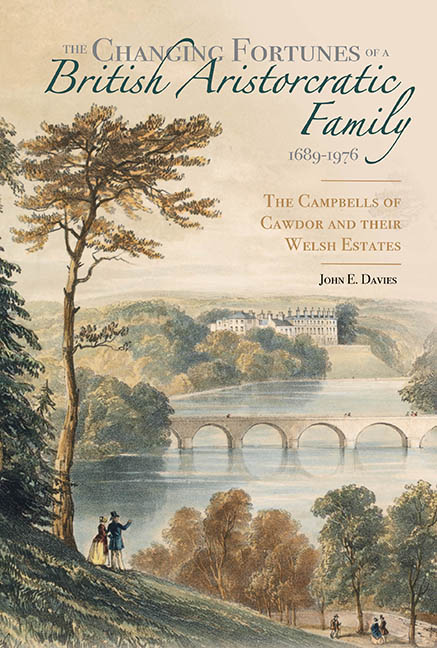 The Changing Fortunes of a British Aristocratic Family, 1689–1976
The Changing Fortunes of a British Aristocratic Family, 1689–1976 Book contents
- Frontmatter
- Contents
- List of Illustrations
- Acknowledgements
- List of Abbreviations
- Pedigree
- Introduction
- 1 Cawdor and Campbell
- 2 Estate Administration
- 3 The Agricultural Estate: The Cawdors as Farmers and Landlords
- 4 The Cawdors as Industrial Landowners
- 5 The Cawdors in the Community: Church and Education
- 6 The Mêlée of Local Governance
- 7 The Cawdors in Politics: Interest Building, Consolidation and Decline
- 8 Private and Exclusive Lives
- 9 The End of the Welsh Estates
- Conclusion
- Bibliography
- Index
7 - The Cawdors in Politics: Interest Building, Consolidation and Decline
Published online by Cambridge University Press: 21 March 2020
- Frontmatter
- Contents
- List of Illustrations
- Acknowledgements
- List of Abbreviations
- Pedigree
- Introduction
- 1 Cawdor and Campbell
- 2 Estate Administration
- 3 The Agricultural Estate: The Cawdors as Farmers and Landlords
- 4 The Cawdors as Industrial Landowners
- 5 The Cawdors in the Community: Church and Education
- 6 The Mêlée of Local Governance
- 7 The Cawdors in Politics: Interest Building, Consolidation and Decline
- 8 Private and Exclusive Lives
- 9 The End of the Welsh Estates
- Conclusion
- Bibliography
- Index
Summary
We have seen that the Cawdors wielded great influence at both county and parochial level. This influence was spread over a large area of Carmarthenshire, though they were noticeably weak in the hundred of Derllys, to the west of Carmarthen town, where they held very little land. In Pembrokeshire they were particularly influential in the parishes to the south of Milford Haven. While in the small county of Nairnshire, where they owned about a third of the entire county, they were more or less ubiquitous in their influence. In this chapter we intend to examine the Cawdors’ contribution to Wales and Scotland as members of both Houses of Parliament and as supporters of the status quo, particularly in Wales, in the face of challenges from nationalist campaigns in the late nineteenth century. However it will first be necessary to examine how they became established as the political leaders of south-west Wales, after moving from Scotland in the late seventeenth century.
Sir Hugh Campbell was the first Cawdor to establish himself as a politician in the modern period. He served as MP in the Scottish parliament for thirty years from 1661, though his contributions to that body were never extensive. He was made a privy councillor in 1690 but his attendance, both as a councillor and as a Scottish MP, became increasingly erratic, isolation at Cawdor and poor health being deciding factors, although disillusion with the Scottish political situation may have been the real reason. Campbell welcomed the advent of William in 1688 and later of political union with England, though he was never completely sanguine about the latter: in a letter to Hugh Rose of Kilravock written at the end of 1706, Campbell wrote that ‘although we be very desirous to live in love and friendship with the good people of England, yet we desire not to be incorporate into one kingdom with them, since we are sensible that cannot be without loss of honour and interest [to Scotland]’. He also feared the union might lead to civil war in Scotland. Later on he moved away from the idea of the Union to the extent that he encouraged the Cawdor tenants to support the 1715 Jacobite rising.
- Type
- Chapter
- Information
- The Changing Fortunes of a British Aristocratic Family, 1689–1976The Campbells of Cawdor and their Welsh Estates, pp. 199 - 242Publisher: Boydell & BrewerPrint publication year: 2020


